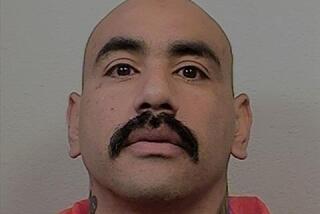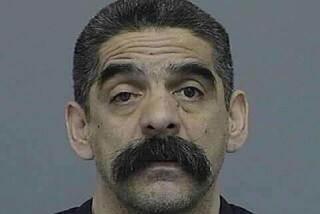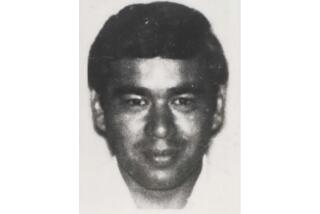Slaying of ‘Fat Herbie’ Evokes Mob’s Heyday
LAS VEGAS — In the end, mobster Fat Herbie Blitzstein wasn’t even that fat. Two heart bypass operations during eight years in the joint had wasted away the extra flesh.
His descent, from mob enforcer’s sidekick to used-car salesman was so complete that when Blitzstein was found dead at home, shot once in the head, police weren’t sure if it was a mob hit or a run-of-the-mill robbery.
Fat Herbie’s decline and fall paralleled the waning influence of the mob in Las Vegas, which dates to Dec. 26, 1946, when Benjamin “Bugsy” Siegel opened the Flamingo Hotel.
The mob, anxious to fill a financial void created by the repeal of Prohibition, saw this dusty gambling mecca as a new cash cow. In the decades that followed, mob figures played a major role in the development of various hotels, skimming in back rooms and shipping the green back East.
It would be decades before federal crackdowns on the mob and state regulation of gaming would begin to turn the tide.
From 1971 to 1986, Chicago enforcer Anthony “Tony the Ant” Spilotro ruled Las Vegas with Blitzstein, his longtime pal, at his side. Spilotro’s role was captured by actor Joe Pesci in the movie “Casino.”
Spilotro, facing trial on racketeering charges in 1986, was buried alive in an Indiana cornfield on the orders of fearful Chicago mob bosses. It meant the end of the mob’s waning influence in Vegas.
Blitzstein went to prison that year on federal income-tax and credit-card fraud charges. The rest of Spilotro’s crew, dubbed the “Hole in the Wall Gang,” found their way to prison on a variety of charges.
A slimmer Blitzstein emerged from prison in 1992, his 280-pound frame trimmed by life behind bars and his two heart operations. He kept a low profile, working at a used-car lot.
Word of Blitzstein’s death last week triggered speculation that it was a mob hit. Police aren’t sure, or aren’t saying.
“Everybody wants to make this a mob hit,” Las Vegas Metro Police homicide Lt. Wayne Petersen said. “It’s too early in the investigation to make any characterization of the homicide.”
Blitzstein, 63, might have been robbed by someone he knew. Property was missing from his townhouse and there were no obvious signs of forced entry, Petersen said.
Police won’t confirm a report by John Momot, Blitzstein’s attorney, that he died of a shot to the back of the head.
Momot said talk of a robbery is “just a cover,” adding he believes the death was “a mob hit or maybe a transaction he had been involved in recently that caused this reaction.”
On Dec. 10 the state Gaming Control Board named Blitzstein for inclusion in Nevada’s infamous Black Book, which bans people with criminal backgrounds from even stepping inside casinos.
His hearing before the senior state Gaming Commission was pending and Momot said that his client had planned to testify and fight the inclusion, but that no one had anything to fear from his testimony.
“Herbie was the last of a breed,” Momot said. “He was not going to hurt anyone. This was the type of guy who was never going to give testimony against anyone. If he’s convicted of a crime, he goes away and does the time. He’s not a rat. He was a stand-up individual.”
More to Read
Sign up for Essential California
The most important California stories and recommendations in your inbox every morning.
You may occasionally receive promotional content from the Los Angeles Times.










